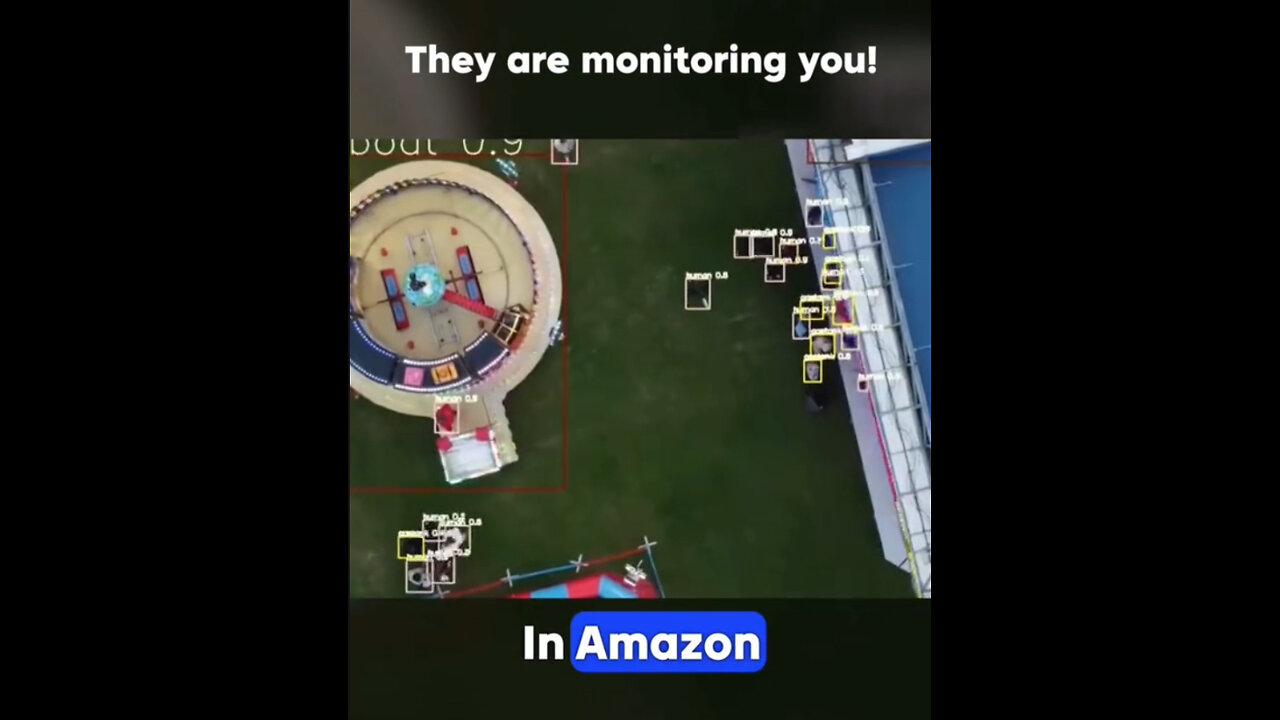Premium Only Content

The Rise of AI Surveillance: The Dawn of a New Digital Dystopia
In the heart of a seemingly ordinary coffee shop, an unsettling reality is unfolding. On the surface, it looks like a typical day—baristas hustling behind the counter, customers waiting patiently for their caffeine fix. But if you look closer, you’ll notice something profoundly different. Each movement, each task, each employee is under the watchful eye of a silent overseer: artificial intelligence. A simple cup of coffee has become a data point in an ever-growing web of surveillance, one that measures not just productivity but human worth in stark numbers and cold algorithms.
It’s not just happening in coffee shops. Across industries, from retail to warehouses, we are witnessing the rise of AI-powered surveillance systems, sophisticated enough to track every motion of an employee, every second spent idle, every deviation from the norm. And as the footage from this coffee shop shows, the implications are terrifying. Elon Musk, who has been outspoken about the dangers of unchecked AI, punctuated this development with a pointed exclamation mark—a warning of what is coming.
This is not the plot of some distant, dystopian future. It’s the present. And if you think this is just about monitoring how many cups of coffee an employee makes, you’re missing the bigger picture. This is the dawn of a world where every action, every choice, every movement is quantified, tracked, and judged by an invisible algorithmic authority. What began as a tool for efficiency is rapidly evolving into a system of total control.
The All-Seeing AI: The New Workplace Panopticon
In the footage of the coffee shop, we see Anna diligently working, making her 20 cups of coffee, while Olga has only made three. The AI tracks this with unblinking precision, assigning numbers to their productivity like a digital foreman. But it doesn’t stop at simple observation. The data is sent directly to the boss, who can use it to evaluate, reward, or penalize employees. AI is no longer a passive tool—it has become an active enforcer.
This mirrors what’s already happening in Amazon warehouses, where AI tracks employee movements with frightening accuracy, measuring the time they take to pick items, walk between shelves, and even go to the bathroom. Low productivity? The AI has the authority to generate termination notices, removing the need for human intervention entirely. Workers are not just laborers—they have become data points in a massive algorithmic system, where efficiency is the only value that matters.
In this new digital panopticon, the AI is not just a manager—it is the judge, jury, and executioner. And the scariest part? There is no room for context. No room for the human nuances that explain why Olga might be behind on her tasks—maybe she had a difficult morning, maybe she’s feeling unwell, or maybe she’s simply taking a moment to breathe. To the AI, none of this matters. She’s only made three cups of coffee, and that’s enough to mark her as an underperformer.
The Death of Privacy: A World Under AI’s Watchful Eye
The most chilling aspect of this AI surveillance isn’t just that it can monitor employees’ productivity. It’s that this technology is spreading. What started in warehouses and coffee shops could soon become a ubiquitous presence in every aspect of our lives. Self-driving cars are already equipped with sensors and AI systems that track not only your location but how you drive, where you stop, and how long you stay in one place. Smart home devices can listen in on conversations, monitor energy use, and adjust environments without your direct input—all of this is logged and analyzed.
Imagine a world where everything—from your online activity to your shopping habits, to how much time you spend on your lunch break, or even how fast you walk—can be monitored, calculated, and analyzed by AI. Every part of life could soon become a data point, fed into systems designed to maximize efficiency, predict behavior, and ultimately, control outcomes. We’re rapidly approaching a future where privacy no longer exists, where everything we do is subject to AI surveillance and algorithmic judgment.
But here’s the most disturbing part: what happens when the AI is wrong? When a glitch in the system causes it to flag you as unproductive, inefficient, or undesirable? Who do you appeal to when your future is determined by an AI that has no capacity for empathy, no understanding of human complexity, and no room for error?
The Human Cost: Efficiency Over Humanity
The fundamental flaw in this increasing reliance on AI-driven surveillance is that it reduces human beings to data points. In a system designed to maximize efficiency, human complexity, emotion, and imperfection become liabilities rather than assets. When every second is monitored, when every action is recorded, the freedom to be human begins to erode. You no longer have the luxury of being tired, or distracted, or even simply human.
In the coffee shop, Olga isn’t just an employee—she’s a person with her own life, her own struggles, her own reasons for why she might not be working at her full potential that day. But to the AI, she is simply an underperformer, someone to be flagged and perhaps reprimanded. This is the fundamental flaw of an AI-dominated world: it seeks to optimize everything, without considering the messiness and unpredictability that makes us human.
This drive for efficiency comes at a profound cost: the erosion of human dignity. Workers like Olga and Anna are no longer seen as people—they are metrics. And when metrics become the sole measure of value, compassion, creativity, and individuality fall by the wayside.
The Next Phase: AI Surveillance of Society
The deployment of AI surveillance in workplaces is just the beginning. If AI can track every movement, every second of productivity in a coffee shop, what’s to stop it from doing the same in schools, public spaces, or even in our homes? What happens when children are monitored for how quickly they learn or how well they follow instructions? What happens when AI governs public spaces, tracking how citizens move, who they meet, and where they go?
In China, this reality is already unfolding with the introduction of social credit systems, where citizens are ranked based on their behavior, financial activity, and even their social interactions. Those with low scores find themselves barred from accessing services or even leaving the country. While the rest of the world may not have such an overt system in place yet, we are inching closer to a society where AI surveillance could become a form of social control.
The real danger is not just the technology itself but the power structures behind it. Who controls the data? Who decides what behaviors are acceptable or unacceptable? Who programs the AI that monitors our lives? The more power we hand over to AI systems, the more we risk becoming subjects of algorithmic rule, living in a world where our choices, behaviors, and even thoughts are shaped by hidden forces beyond our control.
Elon Musk’s Warning: A Glimpse into the Future
When Elon Musk, one of the world’s leading innovators and proponents of AI, gave this video an exclamation mark, it wasn’t just a reaction to the novelty of AI in a coffee shop. It was a warning. Musk has long cautioned against the unregulated development of AI, suggesting that without proper checks, AI could become dangerously powerful, overtaking human decision-making in ways we can’t predict or control.
Musk’s exclamation mark is a signal to wake up—to realize that we are on the brink of a future where AI surveillance and algorithmic control could reshape society in profound ways. We must ask ourselves: How much control are we willing to give up? How much of our privacy, our freedom, and our humanity are we willing to sacrifice for the sake of efficiency and productivity?
The Path Forward: Resisting the AI Takeover
As AI surveillance becomes more integrated into our daily lives, we face a choice: Will we passively accept this shift toward total digital oversight, or will we demand that human values—empathy, freedom, creativity—remain at the center of our society?
We must be vigilant. Transparency and accountability must become the foundation of AI development and implementation. We cannot allow the unchecked growth of AI systems that treat human beings as mere cogs in a machine. We need to question who controls these systems, how they are being used, and what kind of future they are creating.
The dawn of AI surveillance is upon us, but the future is still ours to shape. We can either be passive subjects in an algorithmic world, or we can rise to the challenge and demand a society where technology serves humanity—not the other way around.
-
 1:50
1:50
FragmentsOfTruth
1 day agoDied Over $539: The Tragic Cost of American Healthcare
1441 -
 DVR
DVR
Kim Iversen
4 hours agoElon's Pumping Out Babies Like They're Tesla Model 3's | EU Panics Over Peace Talks, Wants More War
34.3K35 -
 LIVE
LIVE
Man in America
7 hours agoFort Knox & Trump’s Secret Gold Move—The Financial Reset NO ONE Is Ready For?
1,639 watching -
 LIVE
LIVE
Flyover Conservatives
21 hours agoIs America Following The Footsteps of The French Revolution? - President’s Day Special - Historian Bill Federer | FOC Show
1,153 watching -
 2:21:20
2:21:20
Robert Gouveia
4 hours agoTrump Goes to SCOTUS! Judge CAVES on DOGE? Fani Willis Not Happy!
41.8K13 -
 20:41
20:41
Stephen Gardner
4 hours ago🔥You Won't BELIEVE What JUST Happened To Don Trump Jr.!!
40.6K93 -
 UPCOMING
UPCOMING
Anthony Rogers
4 hours agoEpisode 354 - The Kala Method
34 -
 58:00
58:00
The StoneZONE with Roger Stone
2 hours agoEuropean Leaders Resist Trump Peace Overtures To Their Own Demise | The StoneZONE w/ Roger Stone
16.1K2 -
 9:29
9:29
AlaskanBallistics
4 hours ago $0.75 earnedWyoming Suppressors and Rifles at Shot Show 2025
17.9K2 -
 1:06:40
1:06:40
Donald Trump Jr.
7 hours agoThe Left is Taking one L After Another, Live with Michael Knowles | Triggered Ep. 217
110K92